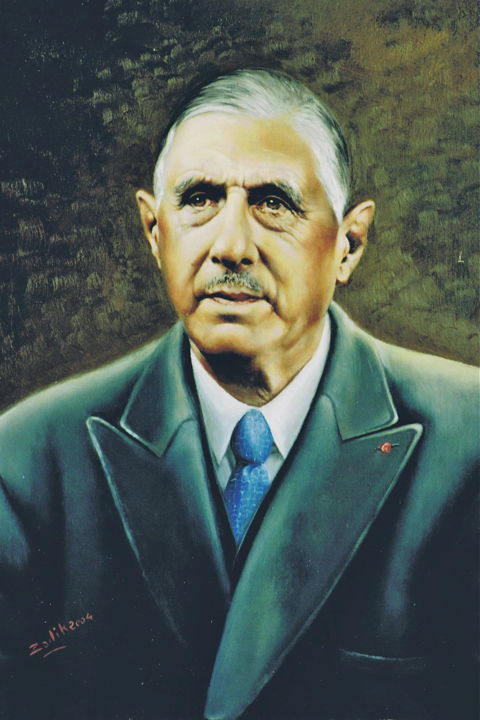Charles De Gaulle
In just a few days – November 9, to be exact – it will be the 42nd anniversary of the death of former French President Charles de Gaulle. The “Man of Destiny,” as Winston Churchill called him, is revered in his homeland for rallying the Free French Forces after Nazi Germany took over France in 1940.
De Gaulle is considered one of the great French leaders in history. But he has been reviled outside of France for being arrogant, autocratic and unreasonable in his dealings with other countries.



Indeed, he was a complex man. What is little known about him is the depth of his character and his capacity for love and tenderness. He didn’t show these qualities to many people, but he showered them on his youngest daughter Anne, who had Down Syndrome.
Charles De Gaulle Airport Map
Charles de Gaulle is the flagship of the French Navy (Marine Nationale). The ship is the tenth French aircraft carrier, the first French nuclear-powered surface vessel, and the only nuclear-powered carrier completed outside of the United States Navy. She is named after French statesman and general Charles de Gaulle. This is the central question posed in Jonathan Fenby’s fascinating The General: Charles de Gaulle and the France He Saved. The book provides a vivid and eminently fair assessment of its subject, bringing out the essential ambiguities: de Gaulle was both a doer and a dreamer, an extreme realist “remorselessly applying cold logic,” and a. Charles de Gaulle has 66 books on Goodreads with 1940 ratings. Charles de Gaulle’s most popular book is The Complete War Memoirs of Charles de Gaulle. Charles de Gaulle was born in Lille on 22 November 1890 and grew up in Paris, where his father was a teacher. De Gaulle chose a military career and served with distinction in World War One. Charles de Gaulle - Charles de Gaulle - Return to public life: De Gaulle’s compatriots were deeply divided on the question of his return to public life. The reasons for their hesitation belong to the political history of the period. The opportunity presented itself in May 1958 when the insurrection that had broken out in Algiers threatened to bring civil war to France. De Gaulle must have.
He sang songs to her and read her stories. He called her “my joy” and said, “She helped me overcome the failures in all men and to look beyond them.”
Veil of secrecy
De Gaulle and his wife Yvonne did not reveal publicly that their daughter, born in 1928, had intellectual and physical disabilities. In fact, there is very little evidence of Anne’s disability in the French archives that chronicle de Gaulle’s life. Their silence no doubt was related to the eugenics movement that was sweeping Europe and the United States at the time and the shame involved in having a “defective” in the family.
Despite their insistence on secrecy, Anne was not sent away to an institution. She lived her entire life with her family. And even though she had difficulty walking, she traveled extensively with her parents.
One of the few mentions of her and her condition is contained in a letter de Gaulle wrote his other daughter Elisabeth after Anne died of pneumonia in 1948.
“Her soul has been set free,” he wrote. “But the disappearance of our little suffering child, of our little girl with no hope, has brought us immense pain.”
Anne’s lasting influence

Anne de Gaulle’s legacy lives on. After her death, Yvonne and Charles created a foundation in her honor and established a hospital for girls with intellectual disabilities. The hospital is in a beautiful chateau near Versailles.
Chateau de Vert Coeur
Charles De Gaulle Significance In France
Today, Anne de Gaulle’s foundation is run by Etienne Ventroux, the de Gaulles’ nephew, and a granddaughter. In keeping with the times, they are focusing less on institutionalization and more on integration of people with disabilities.
Charles De Gaulle Ww2

In 1962, de Gaulle reported that he had been saved from an assassin’s bullet by the frame of a picture of Anne. The picture, which de Gaulle always carried with him, had been resting on a shelf underneath the rear windshield of a car that was hit by machine gun fire in Paris.
Charles De Gaulle After Ww2
I continue to be amazed at the number of people – including the famous and powerful — who have first-hand experience with intellectual disabilities. Charles de Gaulle’s story, even though fraught with pain and grief, is nevertheless hopeful. It has a more positive outcome than many others from that era.
I am hopeful that in the 21st century, with the focus on inclusion and possibilities, with greater understanding and less fear and shame, that there will be too many stories to count of positive outcomes for people like Anne.